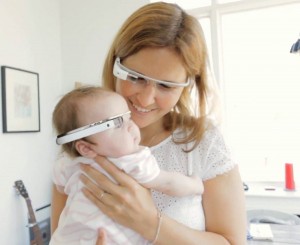This subject is very unusual for my blog but I just had to post it as I find these developments so alarming. The proliferation of fixed and mobile video recording devices into our daily lives is intrusive enough but the Google Glass project sticks us firmly into the world of Big Brother.

This mockup based on a photo provided by Google shows one possible result of their wearable computer catching on for use by more than just adults
And where next? Maybe we should implant a sensory microchip into the body at birth. It will be for our benefit, after all…….
This is most positive view I could find of the latest technologies epitomised by Google Glass……scary enough, you might think.
To quote Nicholas Negroponte in Being Digital,
These technologies will evolve into “a digital butler… [it] recognises callers, disturbs you when appropriate, and may even tell a white lie on your behalf. The same agent is well trained in timing, versed in finding the opportune moments, and respectful of idiosyncrasies.”
In the future, wearable technologies will help us manage our lives, keep us in tune with our bodies through on-body sensors, augment our minds and allow us to be more independent of the physical desktop computing infrastructure that currently limits us.
I personally think that this is a much more accurate and frightening assessment.
To quote Nick Pickles, director of privacy campaign group Big Brother Watch,
Like nearly every online service, Google’s greatest sleight of hand was to make us all think of ourselves as Google customers, when in reality we – or more accurately, data about us – are Google’s product. Advertisers are the customers, generating around 96% of Google’s revenue.
In this arrangement, we used free services, and – current anti-trust investigations aside – if we didn’t like the deal, we could choose to use a different service. Google Glass tips that choice on its head.
Now the people making the choice are the ones wearing Glass, but whoever asked what the Glass sees for its permission to be monitored? And don’t think for a second you’re in control of the data from your own Glass. You’re just a conduit for data collection.
It makes CCTV cameras look trivial. Here is a real-time, always-on, internet-connected data stream being fed in – not from a fixed position on a building, but from among our everyday lives. The person next to you isn’t just another commuter any more, they’re a Google agent. What they see, Google sees and can use, store and, after that, who knows? Facial recognition analysis? Your picture on a billboard? In reality, it is an academic question. If there’s someone willing to pay for it, it will almost inevitably happen.
Choice is key to trust in the digital economy and Glass doesn’t just challenge our assumptions about consent, it challenges whether we even have a choice any more. And that can’t be good for anyone.
For a very comprehensive analysis of the issues read Ed Champions blog here www.edrants.com/thirty-five-arguments-against-google-glass/